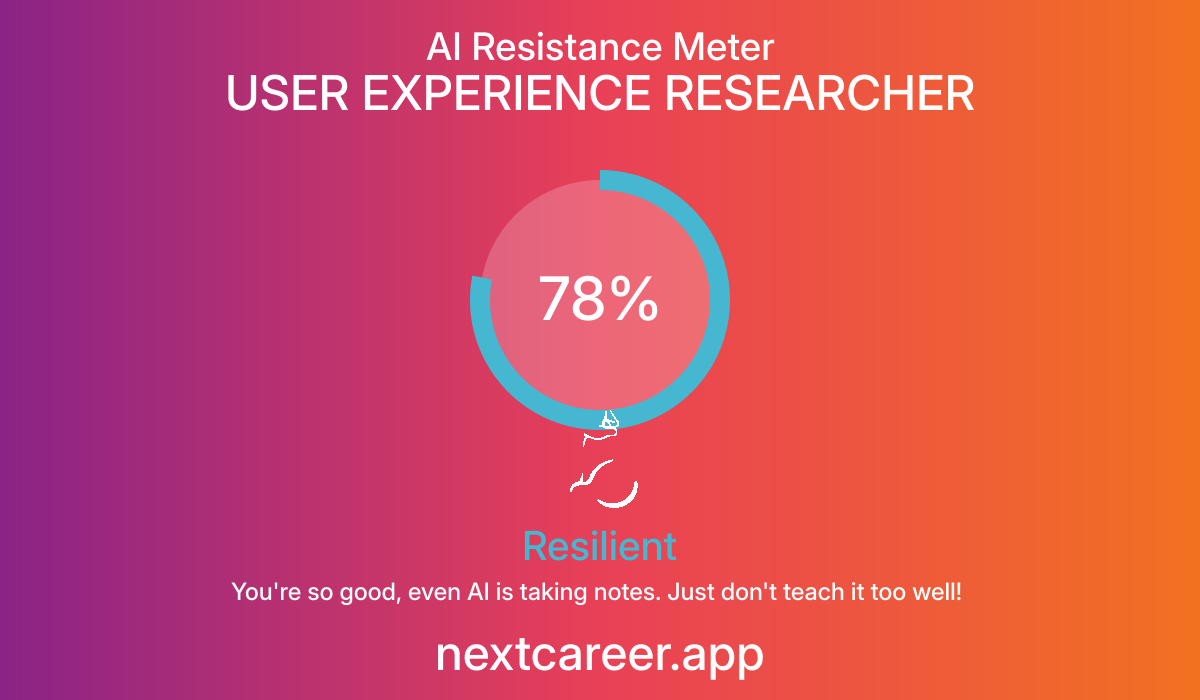AI Resistance Analysis
USER EXPERIENCE RESEARCHER
USER EXPERIENCE RESEARCHER
AI Resistance Score
AI Resistance Meter
Resilient
USER EXPERIENCE RESEARCHER
You're so good, even AI is taking notes. Just don't teach it too well!
User Experience Researchers engage in a blend of qualitative and quantitative research methods to understand user behavior and preferences, which is complex and requires deep emotional intelligence and creativity. Although advancements in AI, such as natural language processing and analytics tools, could aid in data gathering and initial analysis, the nuanced interpretation of findings and incorporation of user empathy into design remains a human-centric task. As AI tools become more capable, the role is likely to evolve, focusing on higher-order tasks such as strategic thinking and user advocacy rather than basic research collection.
User Experience Researchers engage in a blend of qualitative and quantitative research methods to understand user behavior and preferences, which is complex and requires deep emotional intelligence and creativity. Although advancements in AI, such as natural language processing and analytics tools, could aid in data gathering and initial analysis, the nuanced interpretation of findings and incorporation of user empathy into design remains a human-centric task. As AI tools become more capable, the role is likely to evolve, focusing on higher-order tasks such as strategic thinking and user advocacy rather than basic research collection.
Key Factors
- Cognitive Tasks: User Experience Researchers engage in cognitive tasks that require critical thinking and analysis, which can be aided but not fully replaced by AI.
- Emotional Intelligence: The ability to connect with users and understand their emotions is a strong human advantage in this role.
- Physical Skills: The role does not significantly rely on physical skills, as many tasks are performed digitally.
- Creative Thinking: Creativity in problem-solving and ideation is essential, and while AI can support this, it cannot fully replicate human creativity.
Human Advantages
- The ability to empathize with users and grasp nuanced human emotions and behaviors.
- Creative problem-solving capabilities that transcend algorithmic approaches.
AI Vulnerabilities
- AI can automate data collection and basic analysis, reducing the need for certain traditional research tasks.
- As AI tools improve, there may be an over-reliance on automated analysis without human contextualization.
Recommended Actions
- Enhance skills in strategic thinking and design advocacy to maintain relevance in the changing landscape.
- Foster collaborations with AI tools to leverage their strengths while emphasizing the importance of human insight.
- Stay updated on advancements in both UX research methodologies and AI capabilities to remain competitive.
In the near term (5 years), emerging AI tools will augment User Experience Researcher roles, allowing for more efficient data gathering and analysis. Long-term (20+ years), the emphasis will shift toward strategic interpretation and ensuring that human factors are adequately considered in design processes. The role may also expand to include collaborative design processes with AI systems, advocating for user-centered design amidst growing automation.

Why Calculate AI Resistance?
Understanding how AI-resistant your career is becoming increasingly important in today's rapidly evolving job market. Our analysis combines multiple factors including required human skills, technological adaptability, and future industry projections to give you a comprehensive view of your career's sustainability.